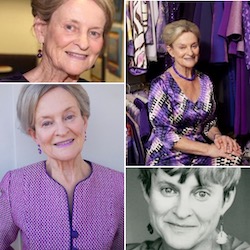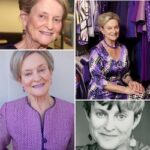
Dr Dale Spender AM
Writer, teacher, feminist
1943-2023
At heart a teacher and a writer and always a feminist, Dale Spender lived a life driven by passion for women’s equality and for education. She published and edited over 30 books and many more articles, book chapters and blog entries on feminism, women’s history and literature, education and new technologies. She brought numerous women along with her, attested to by the number of publications written or co-edited with other established and new writers.
Dale Spender was born in Newcastle, New South Wales, on 22 September 1943, the first daughter of Ivy Davis and Harry (Frank Henry) Spender. That she shared her birth date with early radical feminist and Suffragette, Christabel Pankhurst, was a source of joy and humour throughout her life.
Dale showed signs of rebellion from her early years which were spent on a small property outside of Windsor, NSW. When Dale was 15, the family moved to Strathfield in Sydney where she graduated from Burwood Girls High School with the unusual Leaving Certificate results of first class honours in English and History (for which she thanked her female teachers) and borderline passes in only two other subjects. She was accepted as a special entrant to Sydney University where she completed a Bachelor of Arts and teaching qualifications. Her first teaching appointment was to a boys’ school in Sydney where female staff were still expected to make morning tea – and were excluded from school decision making, often undertaken by male teachers at the local RSL Club.
She later completed an MA in English Literature and a was awarded an Honorary Doctorate by QUT. She travelled to the UK to undertake her PhD at the University of London after her proposal to study ‘mateship in the Australian novel’ was rejected as a thesis topic by the University of Sydney English Department.
An early focus for her activism and writing was girls’ education. Importantly she drew attention to the glaring omission in the body of knowledge deemed valuable by the education system – a recognition and accounting for the experience and achievements of women. She became a firm believer in the advantages offered to girls who attended single sex schools and in 1982 published Invisible Women: The Schooling Scandal, a study of the disadvantage and prejudice in women’s education.
In 1980, Dale published Man Made Language – originally her PhD thesis. The work established her as a feminist academic and remains influential in contemporary analysis of sexism in language and in the social and political reality it creates. Her research unearthed a factor that even women questioned: in mixed sex conversations it was not women who talked too much. It was men who dominated and who interrupted when others, especially women, were speaking. She was delighted when the word ‘mansplaining’ gained currency. She noted that until the terms ‘sexism’ and ‘sexual harassment’ were coined, women who objected to men’s behaviour were mocked as lacking a sense of humour.
In 1982 Dale’s Women of Ideas and what men have done to them, reclaimed the rightful position of women in ideas and literature over three centuries – tracking women’s writing back beyond Daniel Defoe. Reclaiming women’s intellectual heritage, she said, was a deeply feminist act: “Unless we can reconstruct our past, draw on it and transmit it to the next generation, our oppression persists.” (Women of Ideas, 1982).
Dale’s London years until the late 1980s saw her immersed in a literary life and second wave feminism. In London she joined the Fawcett Society, a charity named after Millicent Fawcett, a suffragist and women’s rights campaigner. She adopted the purple, green and white of the suffragists and determined that in future she would wear only purple. She uncovered the Dora Meeson 1908 suffragists banner stowed away at the Fawcett Society and worked to have it returned to Australia where it is now on permanent display in Parliament House. The banner depicts and symbolises the women of Australia, who had the vote; it urges the British Parliament to ‘Trust The Women’ and give them the right to vote as the Commonwealth of Australia had done.
She became part of a network of writers and thinkers and embarked on a period of research involving weeks and months at a time in the British Library (down in the stacks) where she discovered the published books of 18th and 19th century Australian women writers. She had never heard of them. She determined to bring them out of the stacks and onto the bookshelves of schools, libraries and homes.
As editor of Penguin Australia’s Women’s Library and with the establishment of Pandora Press (the Routledge Press feminist imprint), she orchestrated the re-publication of many early women writers whose works had been forgotten. She also produced The Diary of Elizabeth Pepys (1991), a literary spoof based on the famous 17th century Diary of Samuel Pepys. Purportedly written by Elizabeth, Pepys’s wife, the book is a feminist view of women’s lives in 17th century London. For many years she also edited a Women’s Studies international journal with Cheris Kramarae at the University of Illinois.
She was in demand as an inspirational speaker in many countries and formed life-long friendships with women across the world. In England she interviewed and became friends with women from first wave feminism and in 1983 published her lively interviews with them under the title There’s always been a women’s movement this century. Rebecca West offered the oft-quoted “I myself have never been able to find out precisely what feminism is: I only know that people call me a feminist whenever I express sentiments that differentiate me from a doormat, or a prostitute”. These were inspiring words for new, second wave feminists. In Australia, she forged connections with women such as Faith Bandler (an indigenous rights advocate) and Quentin Bryce (Sex Discrimination Commissioner and then Governor of Queensland and Australian Governor General).
On returning to Australia, Dale was criticised by those working in the same intellectual fields as not being scholarly, as too prolific, as a populist and tall poppy. She applied for several academic positions in Australia but was not successful, perhaps on the grounds that are familiar to other intellectuals who made their name and fame outside of Australia. Or perhaps it was because she cheekily advised women that to change the world, they should be rude to men, three times a day. Undaunted, she determinedly forged a new career as a writer, consultant and speaker in areas as diverse as copyright, information technology, indigenous and girls’ education. In 1995 she published Nattering on the Net: Women, Power and Cyberspace, arguing that new technologies were being used to exclude women from culture and society just as a male controlled publishing industry had done in previous times. In Brisbane, where she has lived since the late 1980s, she was instrumental in establishing the Second Chance Program, with her friend Majorie Morton, an organisation that raises funds to assist homeless women.
She was close to her family. She had a strong bond with her parents, especially her mother, and with her brother Graeme and sister Lynne. She and Lynne together published Scribbling Sisters, a collection of letters that they wrote to each other from different continents. She was an eccentric ‘purple aunt’ to Graeme’s and Lynne’s children. She lived for over 45 years with Ted (Emeritus Professor ET) Brown AC, an academic and geotechnical engineer acknowledged as an eminent scholar and world expert in the field of rock mechanics. She once said that she would never have been published but for Ted’s absolute insistence that she ‘do her homework’ before putting her words into print.
Dale Spender was intelligent, witty, creative, generous, prolific and brilliantly controversial. She will be sadly and sorely missed by those who knew and loved her and who benefitted from her generosity and humour, her prescience and her lifelong commitment to feminism and women’s equality.
Kirsten Lees and Lynne Spender
November 2023


 Second Chance Programme is a charitable organisation set up in 2001 to raise awareness of the plight of homeless women and their children.
Second Chance Programme is a charitable organisation set up in 2001 to raise awareness of the plight of homeless women and their children. 

